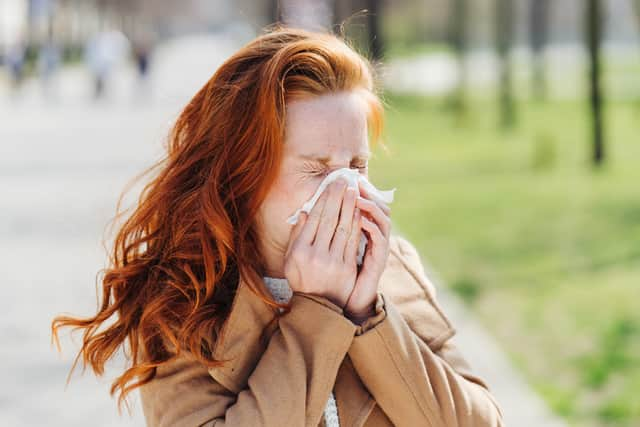Hay fever to affect ‘significantly’ more people due to climate change, doctor warns
and live on Freeview channel 276
The number of people at risk of suffering hay fever symptoms is “significantly increasing” because of climate change, a leading doctor has warned.
As the amount of carbon dioxide rises in the atmosphere it is increasing how much plants breathe in which then leads to more pollen being released, according to Dr Matt Doyle, a General Practitioner with a specialist interest in Allergy.
Advertisement
Hide AdAdvertisement
Hide AdHe said there are now “larger pollen granules, more plants releasing pollen and the pollen season extending” which is leading to “people having more and more symptoms."
Dr Doyle warned that half of all Channel Islanders could have a hay fever allergy within the next five years.
Speaking to ITV News he explained: "We’re aware that the number of people with hay fever is significantly increasing.
"We think it’s heading towards the 50% mark in the U.S. and in Northern Europe and that is almost certainly due to the warming effect in our climate.”
Advertisement
Hide AdAdvertisement
Hide Ad

It comes after research by Worcester University last year found that climate change was having an impact on the UK pollen seasons. Researchers found that increasingly warmer weather in June was causing birch trees to produce more pollen and the season was getting more severe across the country.
The study found that climate change was affecting different types of pollen in different ways with some starting earlier in the season and others becoming more severe.
Scientists said that hay fever seasons lasting longer could also mean that sufferers experience a “double-hit” of symptoms as pollen seasons overlap.
The Met Office recently warned hay fever sufferers could be facing weeks of itchy eyes and sneezing as high levels of pollen are expected across the Midlands, south of England, Wales and Northern Ireland until Friday (9 June).
Advertisement
Hide AdAdvertisement
Hide AdThe forecaster said more people will begin to suffer from hay fever as the tree pollen season ends and transitions into the grass pollen season.
To cope with symptoms Doctor Milli Raizada, GP and senior clinical lecturer at Lancaster University, recommends people take antihistamine tablets or use nasal or steroid sprays to reduce inflammation.
She said antihistamines can be used as a preventative measure a couple of weeks before high pollen levels are expected, adding that people can stay inside, keep windows closed and wear sunglasses to reduce the level of pollen they are exposed to.
According to the NHS website hayfever sufferers can manage symptoms by putting Vaseline around nostrils to trap pollen, vacuum regularly, and buy a pollen filter for the air vents in cars.
Comment Guidelines
National World encourages reader discussion on our stories. User feedback, insights and back-and-forth exchanges add a rich layer of context to reporting. Please review our Community Guidelines before commenting.
